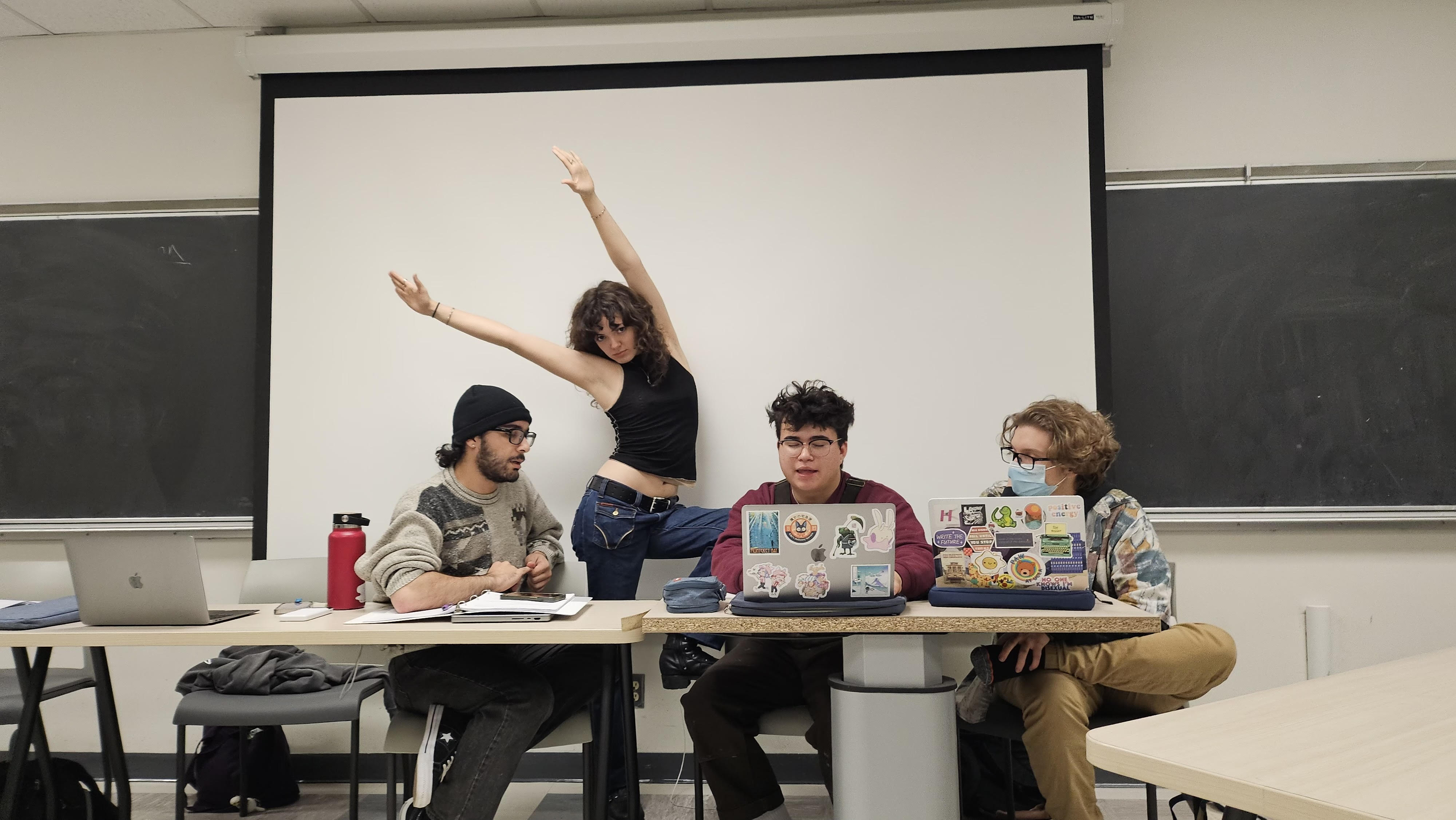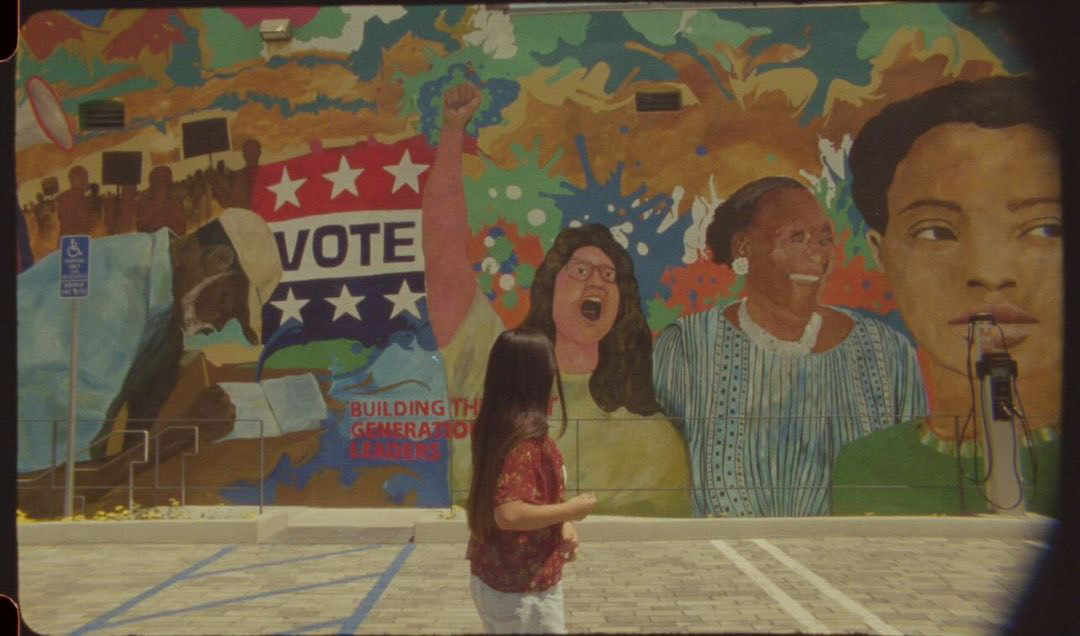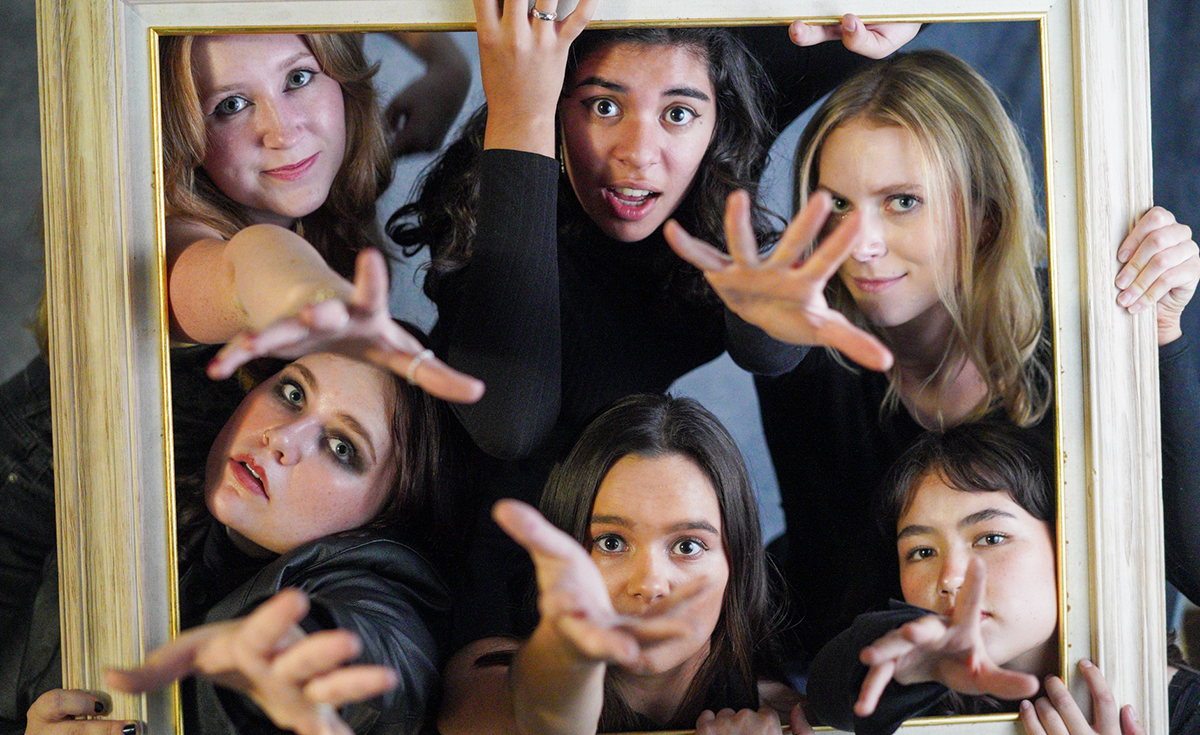Student play ‘You Never Existed’ promises relatable comedy, cultural reflection

Sheldon Skoboloff, Isa Underdahl, Gabe Bate and Tyler Neufeld (left to right) rehearse for their production of Skoboloff’s original play, “You Never Existed.” Co-directed by Skoboloff and Underdahl, the show will run March 1-3 at the Kerckhoff Charles E. Young Grand Salon. (Courtesy of Sheldon Skoboloff)
“You Never Existed”
March 1-3
Charles E. Young Grand Salon
By Yuna Choi
Feb. 29, 2024 6:58 p.m.
This post was updated Feb. 29 at 8:56 p.m.
Viewers will forget reality exists with the new student production, “You Never Existed.”
The original play, which is heavily inspired by Latin media, will take place Friday through Sunday at the Kerckhoff Charles E. Young Grand Salon. Allegorizing historical events, the play is about a Latin American family who hires someone to fix their house, but this laborer gradually takes over the space. Sheldon Skoboloff, a fourth-year theater student, who juggles the roles of playwright and co-director, describes the play as a blend of comedy and drama, with twists and turns that anyone can relate to, no matter their culture.
“I knew that I wanted to write something about my family, immigration and the Latin American struggle,” Skoboloff said. “I decided that I really wanted it to be something that was inspired by true events. … So the whole play is an allegory for Operation Condor, which is when the United States overthrew democratically elected figureheads in Latin America.”
[Related: Alumnus written and directed short film ‘Enamorado’ touches on queer Latino love]
Skoboloff said the creation of “You Never Existed” was made possible through his work in the UCLA theater playwriting program, in which he wrote numerous drafts and received pivotal guidance from professors. As he hadn’t directed anything since high school, Skoboloff said he made the decision to co-direct the play, recognizing the need for someone with more current experience to guide him. Juggling two positions, there were moments where his vision as a playwright conflicted with the practicalities of staging the play as a director, he added.
Co-director and second-year theater student Isa Underdahl said the challenges presented by Skoboloff’s dual role were overcome with open communication, problem solving and a willingness to work together. As a new work, the script was constantly evolving throughout production, providing both prolific opportunities and difficult challenges, she said. Navigating these dynamics has been rewarding while bringing “You Never Existed” to life on stage, Underdahl added.
The play itself serves as a powerful representation of the exploitation experienced by Latin America, particularly through the lens of puppet governments and politicians, said fourth-year theater student Noe Cervantes, who plays Sin Talento 1. The presence of a physical puppet character representing these figures demonstrates the themes of manipulation and control, he added. The production also delves into themes of colonization and identity, exploring the complexities of being from colonized land, Cervantes said.
Considering the deep exploration of stereotypes and Latin representation, Cervantes said navigating the role he plays is a nuanced task. While responsible for embodying these stereotypes, he aims to highlight their absurdity rather than reinforce them, he said. As a member of the community being depicted, Cervantes added he is acutely aware of the delicate balance required to walk the fine line between critiquing rather than perpetuating.
“This is a role that has really allowed me to bring my background in ethnic studies and my own politics,” Cervantes said. “A lot of times, we’ll always say, ‘All art is political.’ But there’s specific things about this work that, for me, it’s so tethered to my experience that I feel like it has heightened my awareness of my own people and how we’re represented.”
Drawing parallels to historical events like Operation Condor, the play highlights the notion of powerful governments interfering with the affairs of others to serve their own interests, Cervantes said. It demonstrates the broader exploitation of Latin American countries by wealthier, developed capitalist nations – notably the United States – he added. This theme is partially presented through the influence of telenovelas, a dramatized form of Latin media that is crucial to many Latin Americans’ identities, Skoboloff said.
“The telenovela is one of the things that really is common across all of Latin America,” Skoboloff said. “I think that when you come to the United States, that’s one of the only things that remains from where you came from. You can’t necessarily find the same restaurants that you used to go to, you can’t maybe find literature in Spanish or Portuguese, but you’re always able to find telenovelas.”
Due to the depiction of heavy topics, the implications of showing violent acts on stage were something important to consider when finding the line between magical realism and dense political topics, Skoboloff said. The presence of humans acting out scenes in front of viewers elicits a distinct response in their brains, which may evoke the fight-or-flight response, Skoboloff said. This influenced his decision to use finger guns instead of props in a heavy scene, he said, as they prompt reflection from the audience.
“It sounds really silly, but when you see the show, you buy into it because you’re already watching all of these other weird things happen in front of you,” Skoboloff said. “Your mind suspends in disbelief for a moment. I think it’s even more impactful than to show an actual gun, because you have to consider: What are the implications of America’s hand being a gun, and what does that mean for the rest of the world?”
[Related: Creators of ‘Dis-topia’ musical embark on journey of self-discovery]
The play also explores themes of familial dynamics within Latin culture with particular focuses on gender roles and matriarchal influence within households, Underdahl said. “You Never Existed” juxtaposes the struggles of masculinity with the strong, often undermined leadership of women, such as the abuela character, she added.
As someone with personal connections to Latin culture, Underdahl said she found resonance in the script’s portrayal of family dynamics. Rehearsals sparked discussions among the cast and crew as they reflected on their own experiences and memories, she added. Audiences may find aspects of their own lives reflected in the play, and she hopes the experience carries viewers through a journey of emotions, she said. Although the play is political, the main takeaways don’t have to be, Cervantes added, as people can expect to walk away after fully encompassing the theater experience.
“I hope to see everybody there,” Cervantes said. “It’s going to be a great show. I want people to come and laugh and cry and applaud. … I really want them to think about, in their life, where they’ve also seen all of these ridiculous characters that we’re going to be playing.”






